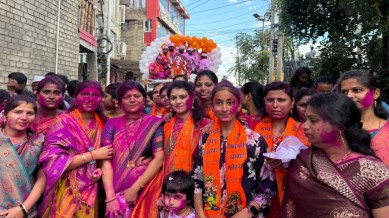Click here to join Express Pune WhatsApp channel and get a curated list of our stories
Ganesh Visarjan in Dal Lake: The celebration of faith and unity
More recently, Pune’s prominent Ganesh mandal led by the Shrimant Bhausaheb Rangari Ganesh Mandal had also taken the festival beyond Lal Chowk. Formally from 2023 onwards, Pune’s mandal has organised Ganeshotsav in Srinagar, Kulgam, and Anantnag, with plans to reach Kupwara and Baramulla next year.

Written by Neha Rathod
As the final chants of “Ganpati Bappa Morya” faded into the breeze over Srinagar’s Dal Lake, the immersion of Lord Ganesha idols this year carried a meaning far deeper than ritual. It was a reaffirmation of faith, of unity across communities, and of Kashmir’s place within the wider canvas of India’s cultural celebrations.
monthly limit of free stories.
with an Express account.
The celebration of Ganeshotsav in Kashmir began with the Galai community—a Maharashtrian group of skilled goldsmiths who made the Valley their home. In 1999, with barely a few families, they founded the Shri Ganpati Seva Mandal at Lal Chowk and began celebrating the Sarvajanik Ganesh Utsav. Today over 300 families religiously take part in the 10 day festival.
For 26 years now, the festival has continued at the Panchmukhi Hanuman Temple, with idols immersed in Dal Lake amid joyous processions. Every year, senior IPS officers, often Maharashtrian by origin, join as chief guests, underscoring the event’s wider resonance. This year, Jammu & Kashmir DIG Rajiv Pandey was part of the immersion ceremony, walking alongside local devotees.
More recently, Pune’s prominent Ganesh mandal led by the Shrimant Bhausaheb Rangari Ganesh Mandal had also taken the festival beyond Lal Chowk. Formally from 2023 onwards, Pune’s mandal has organised Ganeshotsav in Srinagar, Kulgam, and Anantnag, with plans to reach Kupwara and Baramulla next year.
Punit Balan, trustee of the Bhausaheb Rangari Mandal, explained: “Ganeshotsav is celebrated in 175 countries. Why not in Kashmir, where the message of unity is needed most? It is a mission more than a festival,” adds Balan
This year, even after the turbulence of Pahalgam attack and Operation sindoor, the Ganesh visarjan at Lal Chowk stood out for its devotion and grandeur in the valleys of Kashmir. Irrespective of caste and community, everyone gathered — the Hindus, Kashmiri Pandits, and Muslims — to bid farewell to Bappa, their chants echoing across Dal Lake. ‘Right from the beginning, Kashmiri Pandits have been part of this utsav,’ said Sanjay Nahar of the Sarhad group, which has long supported the festival. ‘Even the local Muslims are very cooperative, going to great lengths to ensure every religious practice is carried out as per tradition. That spirit of togetherness is what makes Ganesh Utsav in Kashmir so special.’”
Disturbances in recent months—remind people of the fragility of peace. Yet, the Ganeshotsav processions told another story: Hindus and Muslims walking together, carrying idols shoulder-to-shoulder, creating moments of trust and shared belonging.
Sanjay Nahar, associated with the Lal Chowk mandal, reflected, “ As idols returned to the waters of Dal Lake, dissolving back into nature, they left behind no pollution—only echoes of togetherness. For the Galai families who began this journey in 1999, and for the Pune mandals carrying it forward today, the festival has grown into something larger than tradition.”
Neha Rathod is an intern with the Indian Express
Click here to join Express Pune WhatsApp channel and get a curated list of our stories